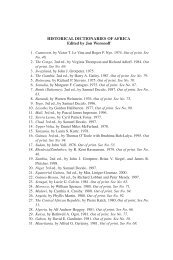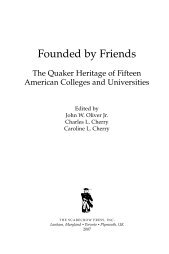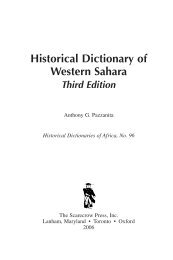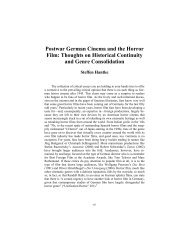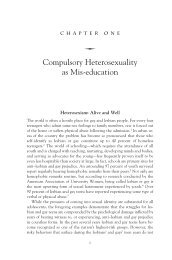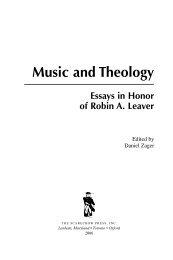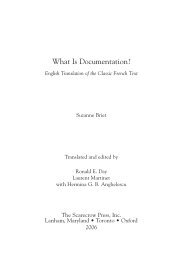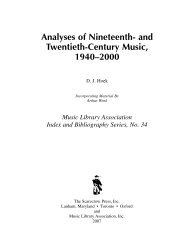Separate Realities: The Dream and the Iceberg - Scarecrow Press
Separate Realities: The Dream and the Iceberg - Scarecrow Press
Separate Realities: The Dream and the Iceberg - Scarecrow Press
You also want an ePaper? Increase the reach of your titles
YUMPU automatically turns print PDFs into web optimized ePapers that Google loves.
88 Chapter 2<br />
<strong>the</strong> economic, political, <strong>and</strong> cultural arenas, with labor unions serving as <strong>the</strong><br />
core alternative organizational force.<br />
Our inclusion of trade unions as a key feature of <strong>the</strong> alternative power networks<br />
does not mean that we view unions as speaking with a single voice for<br />
workers or that we view all unions as consistent advocates for workers’ common<br />
class interests. We recognize <strong>the</strong> labor movement includes diverse <strong>and</strong><br />
sometimes contradictory trends <strong>and</strong> actions. Even so, among organizational<br />
alternatives to corporate power, trade unions possess <strong>the</strong> greatest concentration<br />
of human <strong>and</strong> economic resources <strong>and</strong> represent <strong>the</strong> most significant<br />
alternative organizational force countering corporate dominance. But this<br />
recognition does not diminish <strong>the</strong> importance of o<strong>the</strong>r organizations in <strong>the</strong><br />
alternative power networks, some of which are linked to leaders <strong>and</strong> funding<br />
sources associated with privileged-class backgrounds. Some of <strong>the</strong>se individuals<br />
<strong>and</strong> groups might, in some sense, be considered “class traitors” by<br />
more conventional privileged-class members. Such organizations include<br />
women’s rights groups (e.g., National Organization for Women), civil rights<br />
groups (e.g., National Association for <strong>the</strong> Advancement of Colored People),<br />
public interest groups (e.g., Ralph Nader’s numerous organizations), alternative,<br />
pro-new-working-class national circulation magazines (e.g., Nation,<br />
Progressive, Mo<strong>the</strong>r Jones, In <strong>The</strong>se Times), progressive research <strong>and</strong> policy<br />
groups (e.g., Economic Policy Institute), <strong>and</strong> some religious organizations.<br />
<strong>The</strong>se groups, often in conjunction with trade unions, are frequently involved<br />
in challenging <strong>the</strong> strategies, objectives, <strong>and</strong> policies of <strong>the</strong> dominant<br />
power networks.<br />
Inequality <strong>and</strong> Inequity<br />
<strong>The</strong> efforts of alternative-power-network groups to promote economic, political,<br />
<strong>and</strong> social policy changes that will reduce class-, gender-, <strong>and</strong> race-/<br />
ethnicity-based inequalities call attention to <strong>the</strong> distinction between inequality<br />
<strong>and</strong> inequity. Inequality refers to <strong>the</strong> objective reality (factually verifiable)<br />
that various distinct <strong>and</strong> identifiable groups (e.g., class, gender, racial/ethnic<br />
groups) receive unequal shares of various forms of scarce <strong>and</strong> valued resources<br />
distributed within <strong>the</strong> society. For example, much of <strong>the</strong> evidence presented<br />
thus far concerning differences in <strong>the</strong> distribution of consumption <strong>and</strong> investment<br />
capital illustrates that <strong>the</strong> highly unequal economic <strong>and</strong> political outcomes<br />
people experience in <strong>the</strong> United States are often based on <strong>the</strong>ir membership<br />
in class, gender, <strong>and</strong> race-/ethnicity-based groups.<br />
Inequity refers to a subjective judgment that <strong>the</strong> unequal access to scarce<br />
<strong>and</strong> valued resources experienced by groups distinguished by class, gender,<br />
<strong>and</strong>/or racial/ethnic membership is unfair <strong>and</strong> unjust. This concept interprets<br />
<strong>the</strong> organizationally based policies <strong>and</strong> practices used as <strong>the</strong> bases for unequally<br />
distributing scarce <strong>and</strong> valued resources as fundamentally flawed in<br />
<strong>the</strong> sense that <strong>the</strong>y arbitrarily privilege some groups over o<strong>the</strong>rs <strong>and</strong> <strong>the</strong>reby




